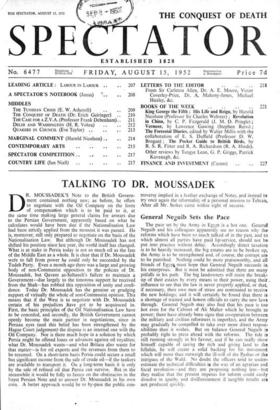TALKING TO DR. MOUSSADEK
DR. MOUSSADEK'S Note to the British Govern- ment contained nothing new; as before, he offers to negotiate with the Oil Company on the form of compensation which is to be paid to it, at the same time making large general claims for arrears due to the Persian Government, apparently based on what he calculates would have been due if the Nationalisation Law had been strictly applied from the moment it was passed. He is, moreover, still only prepared to negotiate on the basis of the Nationalisation Law. But although Dr. Moussadek has not shifted his position since last year, the world itself has changed. What is at stake in Persia today is not so much oil as the fate of the Middle East as a whole. It is clear that if Dr. Moussadek wet e to fall from power he could only be succeeded by the Tudeh Party. Even a month ago there was a large and growing body of non-Communist opposition to the policies of Dr. Moussadek, but Qavam as-Sultaneh's failure to maintain a Government—due largely to the timorous support he received from the Shah—has robbed this opposition of unity and confi- dence. Today Dr. Moussadek has the genuine or grudging support Of virtually the whole of non-Communist opinion. This means that if the West is to negotiate with Dr. Moussadek certain of his prejudices ,Jfave got to be acquiesced in. First, the basic principles of the Oil Nationalisation Law have to be conceded, and secondly, the British Government cannot openly become the main partner in negotiations, since in Persian eyes (and this belief has been strengthened by the Hague Court judgement) the dispute is an internal one with the Oil Company. Nor is there much hope in a solution by which Persia might be offered loans or advances against oil royalties; what Dr. Moussadek wants—and what Britain also wants for that matter—is for oil exports and the revenues from them to be resumed. On a short-term basis Persia could secure a small but significant income from the sale of crude oil—if the tankers are available to transport it. On a long-term basis it is only by the sale of refined oil that Persia can survive. • But in the meanwhile it would be folly to fasten on the obstinacies in the latest Persian Note and to answer Dr. Moussadek in his own coin. A better approach would be to by-pass the public con- troversy implied in a further exchange of Notes, and instead to try once again the informality of a personal mission to Tehran. After all Mr. Stokes came within sight of success.


























